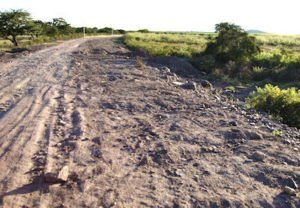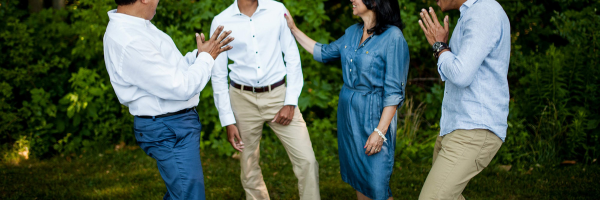Santos Molina lives in an adobe house he built bit by bit, “with the little I earned, although sometimes we went without.” Santos was tired of watching his children breathing in dust and hoped that improving the road would make it useable during the rainy season when it turned into a muddy quagmire.
But María and Santos eventually realized that the road was no more than a pipedream. Only a small portion of the million dollars was ever used to improve the road.
Who is responsible for this situation?
The Ministry of Finance, the incompetence of the supervisor of Public Works, Transport, and Housing–SOPTRAVI, along with a lack of transparency, supervision, and accounting in the use of the funds.
A construction project left unfinished
In 2006, under Legislative decree Nº 80–2006, the Honduran Congress made out two checks for the amount of 10 million lempiras each, in the name of SOPTRAVI, in order to begin construction of the road in Nacaome. According to information provided by SOPTRAVI, the project was not bid by construction contractors until 2007. At the end of 2008, the construction company Constructora Marve S. de R.L. together with ES Constructores S.A. de C.V., began construction of the 12 kilometers of road, only to halt construction in May of 2009.
The road turns into Public Enemy #1 for the local population
Revistazo.com, in a visit to the area around the unfinished road, reported a dirty and intransitive expanse of dirt, rocks, and dust. As the base of the road became rutted, drivers were forced to fill the ruts with material they removed from other areas of the road. Neighbors say that work on the road began in May of 2008, which happens to coincide exactly with the rainy season in this part of Honduras. In a short time, the piles of dust and dirt left abandoned by the tractors turned into muddy channels which continually flowed into the homes nearest the road. Santos actually lost one home after the mud damaged it badly enough to leave it uninhabitable and for María, leaving her home in rainy season is an odyssey.
Road work paralyzed because Finance didn’t give all the money to SOPTRAVI Revistazo.com consulted María Judith Gómez, civil engineer and coordinator of the SOPTRAVI Project. Gómez explained in a few words that the project was discontinued because the Ministry of Finance did not give the necessary funds to pay the construction companies. When asked if these types of projects are given sufficient supervision, Gomez answered succinctly, “No.”
Who requested funds from Congress and then failed to supervise this Project?
The three congressional representatives from Valle are Alfredo Saavedra, Ana Julia García Villalobos, Ersy Mejía y Eleazar Juárez. According to the Democracy without Borders Foundation in their legislative productivity report for 2008, it was Saavedra who requested the 20 million lempiras to build the road.
“Public Works” by congressional representatives with no supervision.
Martha Sabillón, the legal representative of Democracy without Borders (FDsF), explains that partisanship in the distribution of the subsidies fund is not the only problem. A bigger problem is that these funds are neither supervised nor audited. “This is the biggest weakness of this system—that although the law requires financial reports be filed with the Secretary of Finance as well as an audit by the General Accounting Office, in fact, neither of these processes are carried out.”
Sabillón explains that the only financial control managed by Congress is an informal expense report after that project is carried out. Congressional representatives can present receipts and once those are filed, they can ask for a subsequent subsidy to carry on with a project.
Guillermo Casco Callejas, legal representative for the Organization of Private Development Organizations in Honduras, (FOPRIDEH) also believes the lack of reporting is a serious problem in Congress, but he believes it is not just the lack of financial reports but also the lack of accountability regarding the quality of the projects carried out.
Perhaps María y Santos will live out the rest of their days amidst the dust and mud of a road that was used as the hook to get a million dollars by those who are not made accountable. It could be said that a million dollars is not much to build 12 kilometers of road, or that the political crisis of the last year that paralyzed Honduras and left a myriad of unfinished projects and frozen funds has something to do with the uncompleted road. But, is there any excuse that justifies beginning, two years late, a Project that was authorized in 2006? Must the poorest Hondurans pay for this delay?



















